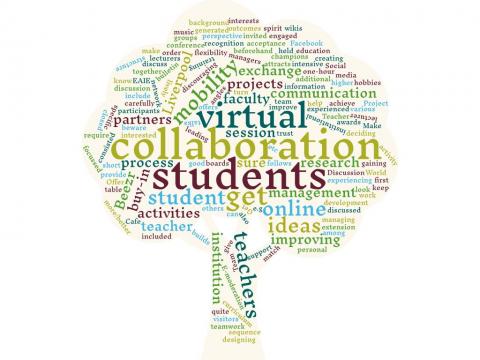At the EAIE 2016 conference in Liverpool the Beezr team held a session where visitors of our World Café were invited to discuss virtual student teamwork and internationalisation@home in higher education from various angles: student, lecturer and faculty management perspective.
The one-hour session consisted of short intensive table talks on improving online collaboration between students and gaining acceptance of this form of internationalisation@home among lecturers and faculty management.
With some reference to the Liverpool Beatles the following questions were discussed….
Come Together - How to get students to work together?
A lively discussion on improving student collaboration generated quite a few ideas, such as:
- Team spirit: make sure students get to know each other first, e.g. background, interests, hobbies, music etc.;
- Project structure: make sure to give your students a clear structure by designing an activity sequence that keeps them engaged and goal oriented on their assignment and research. Make sure that activities require collaboration in order to achieve specific outcomes;
- Social media: creating closed Facebook groups, wikis and online bulletin boards to improve communication and exchange of information and ideas;
- E-moderation: the process of managing the communication of others online.
Twist and Shout - How to get buy-in from teachers?
Some of the participants already had considerable experience in running virtual student collaboration projects. The ideas that were discussed were:
- Professional development of teachers is stimulated by running virtual mobility projects and leading students through the process;
- Getting institutional support, recognition and rewards by providing teachers with training beforehand, carefully matching teachers for collaboration, giving them flexibility in deciding on how to include the virtual projects into the curriculum;
- Finding teachers to take on the role of project champions, a good example can lead to followers but beware that it does not turn to exclusive ownership by a few teachers, this could turn out to be discouraging, because this is a learning process for all teachers;
- Extending the teacher and institution’s network, this builds trust between collaboration partners and offers openings for additional collaboration activities (research, student and teacher exchange) and can help in institution PR which attracts more partners and more and better students.
We Can Work it Out - How to get buy-in from managers?
Management buy-in is of key importance to accommodate and stimulate teachers to include virtual collaboration. Some arguments to convince managers were discussed like:
- Show managers the examples of prior successes, satisfied students and employers who confirm that graduates need virtual collaboration and intercultural skills
- Give good indicators of time of teachers and costs to managers, it can also be a cost saving way to internationalise virtually rather than have students and teachers travelling
- Bottom up and top down acceptance
- Connect virtual mobility with the universities strategic internationalisation aims








